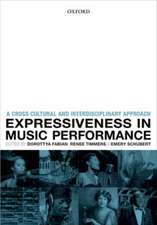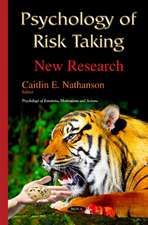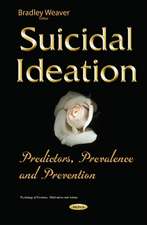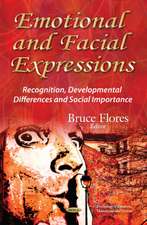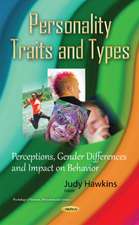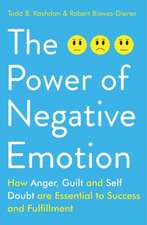Educating People to Be Emotionally Intelligent
Editat de Reuven Bar-On, J.G. Maree, Maurice Jesse Eliasen Limba Engleză Hardback – 29 mar 2007 – vârsta până la 17 ani
Preț: 359.43 lei
Preț vechi: 417.23 lei
-14% Nou
Puncte Express: 539
Preț estimativ în valută:
68.78€ • 72.00$ • 56.91£
68.78€ • 72.00$ • 56.91£
Carte tipărită la comandă
Livrare economică 05-19 aprilie
Preluare comenzi: 021 569.72.76
Specificații
ISBN-13: 9780275993634
ISBN-10: 0275993639
Pagini: 344
Dimensiuni: 156 x 235 x 32 mm
Greutate: 0.69 kg
Editura: Bloomsbury Publishing
Colecția Praeger
Locul publicării:New York, United States
ISBN-10: 0275993639
Pagini: 344
Dimensiuni: 156 x 235 x 32 mm
Greutate: 0.69 kg
Editura: Bloomsbury Publishing
Colecția Praeger
Locul publicării:New York, United States
Notă biografică
Reuven Bar-On is Director of Emotional Intelligence Research in the Department of Psychiatry and Behavioral Sciences, University of Texas Medical Branch. He has been involved in studying and applying various aspects of emotional intelligence since 1980. Bar-On coined the term EQ (Emotional Quotient) in his doctoral dissertation submitted in 1985. This approach to describing emotional-social functioning and competence culminated in the creation of the Bar-On Emotional Quotient Inventory (EQ-i) in 1997, the first measure of its kind to be published by a psychological test publisher and peer-reviewed. Bar-On has authored or edited more than 20 publications on this topic, including The Handbook of Emotional Intelligence (2000).J.G. Maree is a Professor of Education at Pretoria University and Editor of Perspectives in Education. An author or co-author of more than 36 books and 80 articles, he is internationally known for his work in career counseling. His research focuses on optimizing the achievement of disadvantaged learners. He is also a highly rated Researcher with the National Research Foundation in South Africa. Maree was recently honored with Exceptional Achiever status.Maurice Jesse Elias is Director of the Rutgers University Social-Emotional Learning Lab, and a Professor in the Psychology Department at Rutgers. He is also Director of the university's Developing Safe and Civil Schools prevention initiative, as well as Acting Chairman of the Leadership Team at the Collaborative for Academic, Social and Emotional Learning. Among his many publications are Emotionally Intelligent Parenting (2000) and Raising Emotionally Intelligent Teenagers.
Recenzii
Bar-On, Maree, and Elias have put together a book that reflects the rapidly growing global interest in scientifically based applications of emotional intelligence (EI) in education. Although EI has been defined in a variety of ways, the editors focus on five competencies: (1) recognizing, understanding, and expressing feelings; (2) understanding the feelings of others and relating cooperatively; (3) managing and controlling emotions; (4) managing emotions generated by change and solving personal and interpersonal problems; (5) generating positive affect and being self-motivated. The thrust of EI work is to recognize that the IQ has limited value in predicting success and that, to a significant degree, EI can fill the gap..[t]his title will be useful those interested in educational, service, and organizational activities, including the general public. Includes chapter-end references. Recommended. All readers; all levels.
The text has been constructed expertly by a triad of distinguished editors..This excellently written book plainly reveals the salient need for further studies structured well to fill existing gaps in research knowledge in the deeply fissured field of emotional intelligence..The respective contributors to this superbly crafted text are to be commended for deftly painting a revealing picture of emotional intelligence. Their skilled efforts may be a springboard to futher study of EI. Professionals in the mental health field, enveloping psychiatrists, neurologists, psychologists, neuroscientists, and behavioral scientists, should derive great intellectual profit from a close reading of this enriching text. Additionally, persons attached professionally to the field of education, including teachers, special education teachers, school administrators, and school principals, will very likely be quite enlightened by a careful perusal of the books illuminating contents.
Inspired by a reaction to a special issue of Perspectives in Education, contributors (affiliations not stated) synthesize work done in several professions and disciplines on applying emotional intelligence in education. They consider such aspects as its importance, emotionally intelligent parenting, steps in developing a community-based teacher training program designed to educate children to be emotionally intelligent, and the most popular measures of assessing emotional intelligence in adults.
The text has been constructed expertly by a triad of distinguished editors..This excellently written book plainly reveals the salient need for further studies structured well to fill existing gaps in research knowledge in the deeply fissured field of emotional intelligence..The respective contributors to this superbly crafted text are to be commended for deftly painting a revealing picture of emotional intelligence. Their skilled efforts may be a springboard to futher study of EI. Professionals in the mental health field, enveloping psychiatrists, neurologists, psychologists, neuroscientists, and behavioral scientists, should derive great intellectual profit from a close reading of this enriching text. Additionally, persons attached professionally to the field of education, including teachers, special education teachers, school administrators, and school principals, will very likely be quite enlightened by a careful perusal of the books illuminating contents.
Inspired by a reaction to a special issue of Perspectives in Education, contributors (affiliations not stated) synthesize work done in several professions and disciplines on applying emotional intelligence in education. They consider such aspects as its importance, emotionally intelligent parenting, steps in developing a community-based teacher training program designed to educate children to be emotionally intelligent, and the most popular measures of assessing emotional intelligence in adults.

